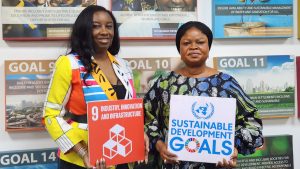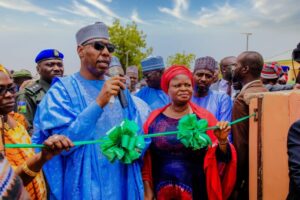SPEECH OF PRINCESS ADEJOKE ORELOPE-ADEFULIRE (MRS)
SENIOR SPECIAL ASSISTANT TO THE PRESIDENT ON SUSTAINABLE DEVELOPMENT GOALS
AT ECOSOC CHAMBER, UN CONFERENCE BUILDING
ON JULY 17, 2017
DURING THE SIDE EVENT OF THE 2017 UNITED NATION HIGH LEVEL POLITICAL FORUM
- Mr Moderator:
- All Protocols observed.
I feel greatly honoured and privileged to be invited to share with you some reflections on this important subject. As I share these reflections, I wish to identify with the Confucius, the 6th Chinese philosopher who once said “Learning without reflection is a waste. Reflection without learning is dangerous”.
I assumed my current office at a time when the country was battling economic recession triggered by the combined effects of a slump in global oil prices and depressed oil production – the main source of revenue and foreign exchange earnings. At the same time, the country was faced with a humanitarian crisis of unprecedented proportions in the North-eastern part of the country as a result of the Boko Haram insurgency.
Prior to this period of economic downturn, the country had registered high economic growth but which growth, unfortunately, was largely jobless and non-inclusive. Consequently, an estimated 62.6% of our people still toil under the burden of poverty with unemployment currently standing at 14.2% while an estimated 27.9% of the population are multi-dimensionally poor; that is, deprived in several domains including health, education, living environment and access to basic amenities. Indeed, income inequality, measured by the Gini Coefficient, stands at 43%. In a nutshell, the impressive economic growth registered between 2000 and 2014 did not translate into tangible development for the people of Nigeria; and many people are, evidently, being left behind.
The Nigerian Government has however, taken a number of remedial measures which I wish to quickly reflect on. The first logical step for us was to identify and target the poor and vulnerable by developing a National Social Investment Programme, with an attendant National Social Register which has the following components:
(i) A Conditional Cash Transfer Programme – a sequenced and graduated programme through which monthly cash transfers is provided to poor people and vulnerable households, starting with those in the lowest poverty quintile, that is, reaching the furthest behind first;
(ii) a home-grown School Feeding Programme targeting Primary 1-3 pupils aimed at increasing enrolment and completion rate at that level, increasing local demand for agricultural products, creating jobs and improving child nutrition;
(iii) a Government Enterprise and Empowerment Programme aimed at providing access to financial services to traders, market women and women cooperatives, artisans and Medium, Small and Micro Enterprises (MSMEs), enterprising clusters/youth, farmers and agricultural workers; and
(iv) The N- Power Programme which is designed to help the youth acquire and develop life-long skills to become solution providers in their communities and players in the domestic and global markets.
These targeted interventions have been undertaken in addition to, and not as substitutes for, increased investments in the productive and social sectors of our economy.
We also continue to implement our flagship Conditional Grants Scheme through which we incentivise State and Local Governments to set aside and utilize 50% and 20% of the cost of select SDGs-related projects in their annual budgets, respectively. Moreover, we have taken active steps to mainstream the SDGs into national, state and sectoral policies, plans and budgets through –among other measures- the on-going work on SDGs Needs Assessment, Policy and Scenario Analyses and ‘Fiscal Space for SDGs Financing’, both of which have been supported by UNDP, as well as the creation of a special ‘SDGs Fund’ – a Bill for which has passed the first reading in Parliament. Mr Moderator, the Nigerian Parliament remains very engaged with the SDGs agenda with two committees on the SDGs having been established in the both Chambers of Parliament.
Mr Moderator, delivering the promise of Agenda 2030 and the SDGs in the North-eastern part of the country which is facing a humanitarian crisis and general insecurity is particularly challenging. We have however, taken active steps to scale up the humanitarian response in that part of the country and bridge the humanitarian – development- peace and security divide. Together with the humanitarian agencies, under the leadership of the UN Humanitarian Coordinator, we have adopted a paradigm shift to the ‘New Way of Working’ and shifted, gradually, towards more joined up analysis and building a common understanding of risks, needs, gaps and existing capacities; defining collective outcomes and designing joint programming with better clarity of roles; and improving monitoring tools to evaluate results. We believe that the SDGs framework offers us an excellent opportunity to address, holistically and in an integrated manner, the root causes of the current humanitarian crisis. Needless to say, the success of the SDGs in such a complex humanitarian context will be dependent not only on the full restoration of peace and security but also the development of area-specific SDG-based Marshall Plans; the full participation and involvement of affected populations; and availability of basic social and economic services.
To conclude, despite the many challenges that we currently face in our efforts to implement the SDGs, we look forward to the future with great optimism for as Soren Kierkegaard, the famous Danish Philosopher once said ‘Life can only be understood backwards; but it must be lived forwards’. We are committed to pursuing all that which is within our power and authority in order to actualise the well-established position that the SDGs must move, swiftly, from the capitals and fancy meeting rooms to the actual trenches in the ‘development battlefield’ which in our case is currently characterised by double economic and humanitarian crises.
I THANK YOU FOR YOUR ATTENTION!



